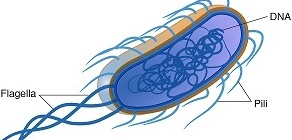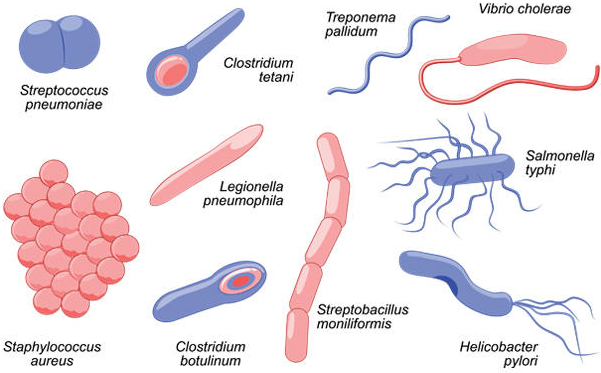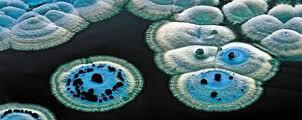Bacteria (singular: Bacterium) is one of the two important members of the prokaryotes (i.e. cells in which the chromosomes are not separated from the cytoplasmic membrane). The second is Archaea. Bacteria are prokaryotic organisms with very simple cell structure. They are single-celled organisms with complex cell wall. Bacterial cells are the simplest possible forms of microorganisms, and they lack mitochondria, Golgi bodies and nuclear membrane.
Bacteria are ubiquitous microorganisms with majority of them occurring in the soil, plants, human body, and as free-living organisms in the environment. They are very small and can only be seen with the aid of the microscope. Bacteria are capable of self replication by binary fission (a type of asexual reproduction in which the parent cell splits to produce the daughter cells or offspring) because they contain all the enzymes and biologically active materials required for their growth and self replication. The two basic forms of bacteria based on their cell wall are: Gram-positive bacteria and Gram-negative bacteria.
Bacterial cells that lack cell wall include Mycoplasmas and L-form bacteria. L-form bacteria are forms of bacteria with different shapes. They are sensitive to osmotic shock. L-form bacteria are formed when bacteria including Gram-positive and Gram-negative bacteria go through a period of nutrient depletion or mutational changes. Bacterial cells without cell wall (which is very critical to the survival of a bacterium) usually exist or live inside other cells under controlled osmotic conditions. Bacterial organisms have been implicated in a variety of infectious diseases that occur in man.
They cause plethora of economic important diseases in man, livestock and even in animals. Some of these diseases are mild while the others are debilitating and can result to the death of the sufferer. Notably, bubonic plague (popularly known as Black Death) caused by the bacterium Yersinia pestis is one of the bacterial diseases that spread from China through Europe in the 14th century killing millions of people as at the time, and the disease was believed to drastically reduce the world’s population during those periods.
Though, Black Death have been contained and eradicated by mankind; tuberculosis caused by Mycobacterium tuberculosis, bacterial vaginosis caused by Bacteriodes species, malaria, typhoid fever, diphtheria and Cholera caused by Vibrio cholerae are amongst the long list of bacterial related infections that are still causing morbidity and mortality in the human race; and these diseases have taken a huge toll on humanity in terms of its devastation.
Some bacterial species have also developed resistance to some already available drugs and this has further worsened the plights of sick people as most of these drugs are no longer as effective in the treatment of infections. Despite the growing cases of some non-infectious diseases such as cancer, hypertension, diabetes and stroke, infections and diseases caused by bacteria still accounts for a significant amount of death in the human population.
References
Brooks G.F., Butel J.S and Morse S.A (2004). Medical Microbiology, 23rd edition. McGraw Hill Publishers. USA. Pp. 248-260.
Madigan M.T., Martinko J.M., Dunlap P.V and Clark D.P (2009). Brock Biology of microorganisms. 12th edition. Pearson Benjamin Cummings Publishers. USA. Pp.795-796.
Prescott L.M., Harley J.P and Klein D.A (2005). Microbiology. 6th ed. McGraw Hill Publishers, USA. Pp. 296-299.
Ryan K, Ray C.G, Ahmed N, Drew W.L and Plorde J (2010). Sherris Medical Microbiology. Fifth edition. McGraw-Hill Publishers, USA.
Singleton P and Sainsbury D (1995). Dictionary of microbiology and molecular biology, 3rd ed. New York: John Wiley and Sons.
Talaro, Kathleen P (2005). Foundations in Microbiology. 5th edition. McGraw-Hill Companies Inc., New York, USA.
Discover more from #1 Microbiology Resource Hub
Subscribe to get the latest posts to your email.



